Aguider
On this page, you find all documents, package deals, and flashcards offered by seller Aguider.
- 43
- 0
- 1
Community
- Followers
- Following
44 items
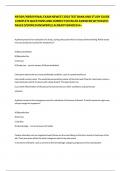
Exam (elaborations) NR509
NR 509 /NR509 FINAL EXAM NEWEST 2024 TEST BANK AND STUDY GUIDE COMPLETE 250 QUESTIONS AND CORRECT DETAILED ASNWERS WITH RATIONALES (VERIFIED ANSWERS) |ALREADY GRADED A+
- Exam (elaborations)
- • 112 pages •
NR 509 /NR509 FINAL EXAM NEWEST 2024 TEST BANK AND STUDY GUIDE COMPLETE 250 QUESTIONS AND CORRECT DETAILED ASNWERS WITH RATIONALES (VERIFIED ANSWERS) |ALREADY GRADED A+
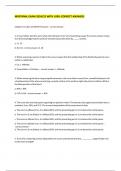
Exam (elaborations) MATERNAL NURSING CARE
MERTANAL EXAM 2024/25 WITH 100% CORRECT ANSWERS Chapterr13:rLaborrandrBirthrProcessesr-rrcorrectranswerr- 1.rArnewrmotherrasksrthernurserwhenrthersoftrspotronrherrsonsrheadrwillrgoraway.rThernursesranswerrisrbasedronrtherknowledgerthatrtheranteriorrfontanelrclosesrafterrbirthrbyr_____rmonths. a.r2rc.r12 b.r8rd.r18r-rrcorrectranswerr-d.r18 2.rWhenrassessingrarwomanrinrlabor,rthernurserisrawarerthatrtherrelationshiprofrtherfetalrbodyrpartsrtoroneranotherrisrcalledrfetal: a.rL.rAttitude...
- Exam (elaborations)
- • 110 pages •
MERTANAL EXAM 2024/25 WITH 100% CORRECT ANSWERS Chapterr13:rLaborrandrBirthrProcessesr-rrcorrectranswerr- 1.rArnewrmotherrasksrthernurserwhenrthersoftrspotronrherrsonsrheadrwillrgoraway.rThernursesranswerrisrbasedronrtherknowledgerthatrtheranteriorrfontanelrclosesrafterrbirthrbyr_____rmonths. a.r2rc.r12 b.r8rd.r18r-rrcorrectranswerr-d.r18 2.rWhenrassessingrarwomanrinrlabor,rthernurserisrawarerthatrtherrelationshiprofrtherfetalrbodyrpartsrtoroneranotherrisrcalledrfetal: a.rL.rAttitude...
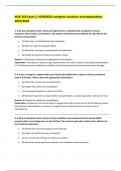
Exam (elaborations) NUR 164
1. A 55-year-old patient with a history of hypertension is admitted with complaints of severe headache, blurred vision, and epistaxis. The patient’s blood pressure is 220/120 mm Hg. What is the priority nursing action? • A) Administer oral antihypertensive medication • B) Obtain an electrocardiogram (ECG) • C) Administer intravenous antihypertensive medication • D) Elevate the head of the bed and monitor closely Answer: C) Administer intravenous antihypertensive medication Ex...
- Exam (elaborations)
- • 10 pages •
1. A 55-year-old patient with a history of hypertension is admitted with complaints of severe headache, blurred vision, and epistaxis. The patient’s blood pressure is 220/120 mm Hg. What is the priority nursing action? • A) Administer oral antihypertensive medication • B) Obtain an electrocardiogram (ECG) • C) Administer intravenous antihypertensive medication • D) Elevate the head of the bed and monitor closely Answer: C) Administer intravenous antihypertensive medication Ex...
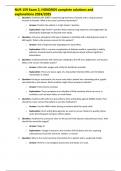
Exam (elaborations) NUR 159
1. Question: A patient with COPD is experiencing shortness of breath and is using accessory muscles to breathe. What is the nurse’s priority intervention? o Answer: Position the patient in a high Fowler's position. o Explanation: High Fowler’s position helps improve lung expansion and oxygenation by allowing the diaphragm to descend more easily. 2. Question: A 65-year-old patient with type 2 diabetes is admitted with a blood glucose level of 600 mg/dL. What is the primary concern fo...
- Exam (elaborations)
- • 12 pages •
1. Question: A patient with COPD is experiencing shortness of breath and is using accessory muscles to breathe. What is the nurse’s priority intervention? o Answer: Position the patient in a high Fowler's position. o Explanation: High Fowler’s position helps improve lung expansion and oxygenation by allowing the diaphragm to descend more easily. 2. Question: A 65-year-old patient with type 2 diabetes is admitted with a blood glucose level of 600 mg/dL. What is the primary concern fo...
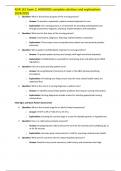
Exam (elaborations) NUR 161
NUR 161 Exam 2, HONDROS complete solutions and explanations 2024/2025 1. Question: What is the primary purpose of the nursing process? o Answer: To provide a systematic, patient-centered approach to care. o Explanation: The nursing process is a framework for providing individualized care through assessment, diagnosis, planning, implementation, and evaluation. 2. Question: What are the five steps of the nursing process? o Answer: Assessment, Diagnosis, Planning, Implementation, Evaluatio...
- Exam (elaborations)
- • 10 pages •
NUR 161 Exam 2, HONDROS complete solutions and explanations 2024/2025 1. Question: What is the primary purpose of the nursing process? o Answer: To provide a systematic, patient-centered approach to care. o Explanation: The nursing process is a framework for providing individualized care through assessment, diagnosis, planning, implementation, and evaluation. 2. Question: What are the five steps of the nursing process? o Answer: Assessment, Diagnosis, Planning, Implementation, Evaluatio...
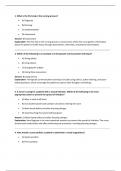
Exam (elaborations) NUR 160
1. What is the first step in the nursing process? • A) Diagnosis • B) Planning • C) Implementation • D) Assessment Answer: D) Assessment Explanation: The first step in the nursing process is assessment, where the nurse gathers information about the patient's health status through observations, interviews, and physical examinations. 2. Which of the following is an example of a therapeutic communication technique? • A) Giving advice • B) Using silence • C) Changing the su...
- Exam (elaborations)
- • 22 pages •
1. What is the first step in the nursing process? • A) Diagnosis • B) Planning • C) Implementation • D) Assessment Answer: D) Assessment Explanation: The first step in the nursing process is assessment, where the nurse gathers information about the patient's health status through observations, interviews, and physical examinations. 2. Which of the following is an example of a therapeutic communication technique? • A) Giving advice • B) Using silence • C) Changing the su...
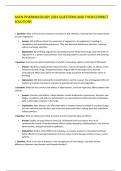
AACN
The questions and answers provided earlier were designed to align with topics relevant to critical care nursing, such as ethical and legal considerations, patient management, and advanced life support protocols. These topics are crucial for critical care nurses to master in order to provide high-quality care in complex and often challenging
- Package deal
- • 5 items •
- Exam (elaborations) AACN-PHARMACOLGY • Exam (elaborations)
- Exam (elaborations) AACN-CRITICAL CARE (Cardiology, Pulmonary, Neurology) • Exam (elaborations)
- Exam (elaborations) AACN-PATIENT MANAGEMENT AND INTERVENTIONS • Exam (elaborations)
- Exam (elaborations) AACN-ADVANCED LIFE SUPPORT AND PROTOCOL • Exam (elaborations)
- Exam (elaborations) AACN--Ethical and Legal Considerations in Critical • Exam (elaborations)
The questions and answers provided earlier were designed to align with topics relevant to critical care nursing, such as ethical and legal considerations, patient management, and advanced life support protocols. These topics are crucial for critical care nurses to master in order to provide high-quality care in complex and often challenging
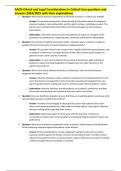
Exam (elaborations) AACN--Ethical and Legal Considerations in Critical
AACN-Ethical and Legal Considerations in Critical Care questions and answers 2024/2025 with their explanations 1. Question: What are the primary components of informed consent in a critical care setting? o Answer: The primary components include providing information about the diagnosis, treatment options, risks and benefits, and the right to refuse or withdraw consent. The patient must understand this information and voluntarily agree to the proposed intervention. o Explanation: Infor...
- Package deal
- Exam (elaborations)
- • 15 pages •
AACN-Ethical and Legal Considerations in Critical Care questions and answers 2024/2025 with their explanations 1. Question: What are the primary components of informed consent in a critical care setting? o Answer: The primary components include providing information about the diagnosis, treatment options, risks and benefits, and the right to refuse or withdraw consent. The patient must understand this information and voluntarily agree to the proposed intervention. o Explanation: Infor...
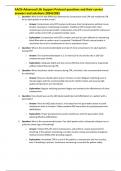
Exam (elaborations) AACN-ADVANCED LIFE SUPPORT AND PROTOCOL
AACN-Advanced Life Support Protocol questions and their correct answers and solutions 2024/2025 1. Question: What are the key differences between the compression-only CPR and traditional CPR for an adult patient in cardiac arrest? o Answer: Compression-only CPR involves continuous chest compressions without rescue breaths, focusing on maintaining circulation. Traditional CPR includes both chest compressions and rescue breaths. Compression-only CPR is recommended for witnessed adult c...
- Package deal
- Exam (elaborations)
- • 14 pages •
AACN-Advanced Life Support Protocol questions and their correct answers and solutions 2024/2025 1. Question: What are the key differences between the compression-only CPR and traditional CPR for an adult patient in cardiac arrest? o Answer: Compression-only CPR involves continuous chest compressions without rescue breaths, focusing on maintaining circulation. Traditional CPR includes both chest compressions and rescue breaths. Compression-only CPR is recommended for witnessed adult c...
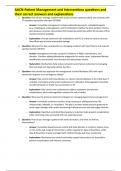
Exam (elaborations) AACN-PATIENT MANAGEMENT AND INTERVENTIONS
AACN-Patient Management and Interventions questions and their correct answers and explanations 1. Question: How do you manage a patient with acute coronary syndrome (ACS) who presents with ST-elevation myocardial infarction (STEMI)? o Answer: Immediate management includes administering aspirin, antiplatelet agents (e.g., clopidogrel), anticoagulants, and thrombolytics if within the time window. Primary percutaneous coronary intervention (PCI) should be performed within 90 minutes of fi...
- Package deal
- Exam (elaborations)
- • 13 pages •
AACN-Patient Management and Interventions questions and their correct answers and explanations 1. Question: How do you manage a patient with acute coronary syndrome (ACS) who presents with ST-elevation myocardial infarction (STEMI)? o Answer: Immediate management includes administering aspirin, antiplatelet agents (e.g., clopidogrel), anticoagulants, and thrombolytics if within the time window. Primary percutaneous coronary intervention (PCI) should be performed within 90 minutes of fi...
